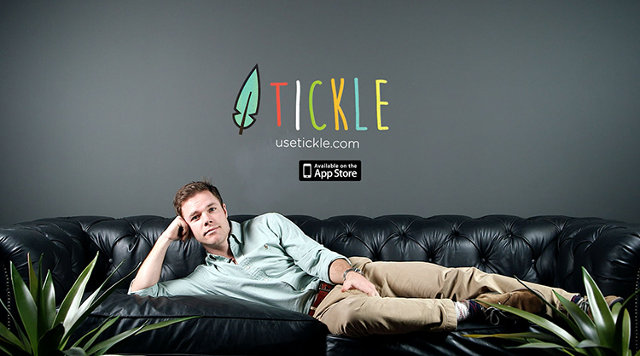Tickle is an app that is always running on the background of your iPhone. It has no UI, and just one purpose: to get you out of socially awkward situations by tracking your nervous twitching.
When Tickle detects through its built-in accelerometer that you are in a cringeworthy conversation--either because you are handling your iPhone nervously or because you've passed it a secret signal by waving it or stroking it in a certain way--the app sends you a fake phone call which you can use to excuse yourself. Tickle can even learn to predict when and where you're most likely to face awkward situations.
It's a simple, brilliant idea. It's also a lie. Although completely plausible from a technical standpoint, Tickle isn't a real app at all. The creation of San Francisco-based designer, musician and film artist Alex Cornell, Tickle is an attempt to use mischief, subterfuge, and parody as a viral design tool to get concepts off of the ground. It only exists as a video. For now.
Tickle is not Cornell's first fake app. In 2011, Cornell had an idea for a spoof of Silicon Valley and our sharing and ranking culture. So while working at his day job, Firespotter Labs, Cornell created what was meant to be a parody video for an app called Jotly, an iPhone-based social network that let people grade and rank everything from garbage cans to restroom toilets.
But what started as parody soon took on a life of its own. "One of our engineers at Firespotter came to me and said, you know, this wouldn't be that hard to do," Cornell tells Co.Design. "So we decided to actually build Jotly and use its momentum to promote our company's 'real' app, Uberconference."

With Tickle, Cornell is trying to capture lightning twice. "I'm actually sort of an awkward person," Cornell laughs. "So I've often wished for an app like Tickle. I'm not an app developer, but with my skillset--design and film--I can get the message across about what I want, and hopefully capture people's imaginations."
But what about the ethical considerations? Tickle, after all, does not present itself as a concept, but rather as a done project, an app that may, even now, be going through Apple's App Store review process. The website even features fake testimonials. Isn't that a lie?
"I don't think Tickle is unethical," says Cornell. "No one is being hurt by this. The negative way to interpret it is that Tickle is a lie, while a more positive take on it is to say it's a prank. I like the word mischief to describe Tickle: mischief sticks in people's minds, and spreads."

And just like with Jotly, Tickle is already on its way to becoming a real app. According to Cornell, he's already heard from one developer who is working on making a real Tickle app. Which is, to Cornell, the whole point of Tickle.
"I come from the music world, where you just put something out there and people jam with it," he says. "That's what I'm trying to do with software development: you start with step one, which is the idea, and then you're open to whatever someone wants to do with step two."
If Tickle ever does become a real app, no matter who makes it, you'll hear about it through the official website.